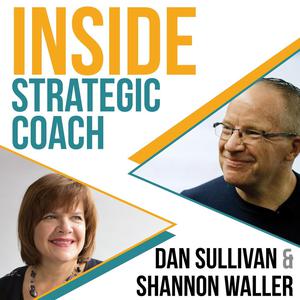
Inside Strategic Coach: Connecting Entrepreneurs With What Really Matters
Dan Sullivan and Shannon Waller
Inside Strategic Coach: Connecting Entrepreneurs With What Really Matters hosted by Dan Sullivan and Shannon Waller
- 15 minutes 32 secondsEntrepreneurs Can’t Move Forward With Costs, Only With Investments
Entrepreneurs always want to be moving forward. What determines whether they’ll be able to is their understanding of the difference between cost and investment. In this episode, business coaches Dan Sullivan and Shannon Waller talk about the growth mindset that lets you improve for the rest of your life—versus the mindset that means you’ll forever be stuck right where you are.
Here’s some of what you’ll learn in this episode:
- The reason why small entrepreneurs are small entrepreneurs.
- Why you won’t get a return on investment if you think of team members as a cost.
- Why becoming a Strategic Coach® member isn’t a cost, but an investment in yourself.
- Why it’s dangerous for your team members if you think of them as a cost.
- How to switch from operating in costs to operating in investments.
Show Notes:
Some entrepreneurs have essentially only created a job for themselves that doesn’t go anywhere.
If you see hiring people as a cost, you might just do all of the work yourself.
When entrepreneurs do everything themselves, 90% of what they do doesn’t actually make sense for them to do.
Investing in team members means you’re freed up to do better work, and that will easily pay for the investment.
When you hire someone, you’re investing more in yourself than in the other person.
If you consider someone to be a cost, that person will know it.
Making an investment is a risk, and it can require courage.
Someone who treats other people as costs treats themselves the same way.
With an investment, you'll put an enormous amount of thinking into it to guarantee that it’s successful.
When you’re making an investment, have a goal for the return and a deadline for that goal.
Resources:
Casting Not Hiring by Dan Sullivan and Jeffrey Madoff
21 January 2025, 2:02 pm - 31 minutes 10 secondsBusiness Lessons For Creating The Job You Want, with Patti Mara
When Patti Mara graduated from university in the recession of 1989, she couldn’t get a job—so she made one up instead. In this episode, Patti shares how she’s achieved entrepreneurial success, the exciting new project she’s launching to support local businesses, and what she’s learned as a long-time coach in The Strategic Coach® Program.
Here’s some of what you’ll learn in this episode:
- The invaluable resource that Patti turned to when she realized she didn’t know how to build a business.
- Some of the most helpful tools Patti learned in her first year at Strategic Coach®.
- The difference between tasks and results.
- The value in separating the fault from the problem.
- “magic” that happens in every Strategic Coach workshop.
Show Notes:
- Entrepreneurship often emerges out of necessity, but being good at making up a job for yourself doesn’t mean you know how to build a business.
- Strategic Coach concepts can dramatically shift an entrepreneur's mindset and ability to build a thriving organization.
- Every coach at Strategic Coach is also a Program member who uses Coach tools and concepts in their own business.
- What you sell is actually the vehicle for how you create value.
- Your business is the value you create to the people you want to work with.
- Everyone wants to feel like they’re winning.
- When team members feel like their roles serve a greater purpose, the whole company culture shifts.
- And once you recognize team members as experts in their roles, you can encourage their innovation and sense of ownership.
- When you empower team members to solve problems rather than to focus on who was at fault, customer interactions get much better.
- Awareness and mindset are more impactful than specific skills when training team members.
Resources:
Blog: Time Management Strategies For Entrepreneurs (Effective Strategies Only)
The 10x Mind Expander by Dan Sullivan
Turning Teams into Heroes and Customers into Raving Fans by Patti Mara
UpSolutions Team Success Program
Blog: What Is A Self-Managing Company®?
Tool: The Positive Focus®
Who Not How by Dan Sullivan and Dr. Benjamin Hardy
Podcast: Team Success
7 January 2025, 2:18 pm - 20 minutes 35 secondsThe Right Way And The Dangerous Way To Think About Ambition
Entrepreneurs need to be ambitious. But what happens when you achieve your ambition? In this episode, Dan Sullivan and Shannon Waller explain the drawbacks of having ambition as a destination and describe the incredible benefits you can expect when you see ambition as a capability.
Here’s some of what you’ll learn in this episode:
- Why Dan sees ambition as an internal capability.
- Measurements you should be making every day.
- What’s made Dan’s life simpler over time.
- How Dan gifts Strategic Coach® members extra years to their entrepreneurial lives.
- What you need to avoid to be continually ambitious, and why.
Show Notes:
- Ambition is a capability, not a destination.
- Simply by continually improving your ambition each day, you’ll experience exponential growth over time.
- Dan Sullivan feels more ambitious at 80 than he did at 50.
- To strengthen your ambition, it’s important to measure your daily accomplishments and strive for continal growth.
- You can measure your progress not just in achievements, but in the ability to accomplish more in less time with greater impact.
- Ambition itself should be measured in terms of increased capability and confidence.
- Simplifying life by eliminating distractions (like television) can reclaim valuable time for personal development and ambitious pursuits.
- Surrounding yourself with growth-oriented individuals, often younger, can inspire and fuel your ambition.
- To be continually ambitious, there are three things you should avoid: celebrity, retirement, and legacy.
- It’s important to focus on being useful and impactful in the present rather than worrying about future legacy.
- Viewing ambition as a capability can also help you feel more fulfilled personally—and have a greater impact on your community.
- Every day, ask yourself what you can do so that you’re more ambitious tomorrow.
- Being around people who aren’t invested in growth is an obstacle to your ambition.
Resources:
Who Not How by Dan Sullivan and Dr. Benjamin Hardy
24 December 2024, 3:09 pm - 18 minutes 39 secondsSuccess Traps Are Harder To Escape Than Failure Traps
For many entrepreneurs who achieve business success early in their lives, repeating that success can be difficult. It’s called the success trap, and in this episode, Dan Sullivan and Shannon Waller explain what the success trap is, why it’s difficult to escape, and how you can safely avoid falling into it.
Here’s some of what you’ll learn in this episode:
- Why some entrepreneurs eventually go on auto-pilot.
- How experiencing a crisis can actually be beneficial to an entrepreneur.
- Why Dan doesn’t take people who are growing and succeeding in their thirties as seriously as people who are growing and succeeding in their sixties.
- How inheriting wealth can lead to a success trap too.
- What’s allowed Dan to be fitter, healthier, and more ambitious at 80 than he was at 50.
Show Notes:
Entrepreneurs who are motivated solely by status will stop once they reach a certain point.
You can lack purpose and the motivation to keep growing yet still find it hard to make a change because the money is good.
Setbacks can be a wake-up call to reinvent yourself and reclaim your drive.
Success is comfortable, while failure is scary, painful, and frustrating.
Failures are prompts for new learning.
Entrepreneurs who are successful over the long haul have learned how to turn failure into a new form of success.
When someone’s successful early in life, it can be difficult to tell how much of that success was due to their capabilities and character and how much of it was simply investment from others.
For some, entrepreneurism is a freedom only from where they came from.
Status-motivated entrepreneurs are very boring, and usually a bit depressed.
Creating wealth is only valuable because it makes you more capable and confident as an entrepreneur.
You need resistance in order to grow.
Growth has to come from within.
For growth-motivated entrepreneurs, the lifestyle that comes with success is just a happy by-product of their drive, not the destination.
Ambition isn’t a destination, it’s a capability.
10 December 2024, 7:14 pm - 38 minutes 43 secondsEntrepreneurs Should Spend Less Time Doing What Others Do Better
The best entrepreneurs want better teamwork so they can achieve greater success, growth, and freedom within their business. But teamwork is even more important and valuable than that. In this episode, Dan Sullivan and Shannon Waller discuss the many ways entrepreneurs can take advantage of teamwork, and outline the extraordinary benefits that come with having great teamwork at your company.
Here’s some of what you’ll learn in this episode:
- How Dan involves himself less and less with what Strategic Coach® team members are doing.
- Why Dan doesn’t worry about how team members achieve results.
- What opportunities open up for entrepreneurs when they rely on team members.
- The greatest compliment Dan can give a team member.
- How Dan communicates the goals of a new project.
- The three questions Dan asks himself every time he gets an idea for a new achievement.
Show Notes:
The more you work on teamwork, the more you can refine what you’re uniquely good at.
It’s useful to think of your entrepreneurial business as a theater production, regardless of what industry you’re in.
There’s a vast amount of teamwork happening back stage in theater to make the whole production work.
Teamwork on your projects can improve but only if you’re improving too—and providing maximum support to your team members.
We are taught from an early age that we have to do the work on our own goals ourselves.
Instead of taking on an activity yourself, ask who can do it better than you.
At the heart of it, Strategic Coach is designed to get you to think about your thinking.
When you decided to become an entrepreneur, you declared to the world that you’re not going to play other people's games—you’re going to play your own game.
By communicating clearly, you leave so much room open for teamwork.
Generally, when entrepreneurs have a big possibility and they're uncertain about it, they get paralyzed.
Uncertainty is not a lack of confidence. It's just a lack of knowledge or information.
A lot of entrepreneurs live their lives very certain, but not confident.
Don’t try to sell your team on an idea until you’re sold on it yourself.
Resources:
Blog: Your Business Is A Theater Production: Your Back Stage Shouldn’t Show On The Front Stage
Book: Who Not How by Dan Sullivan and Dr. Benjamin Hardy
Tool: The Impact Filter™
26 November 2024, 12:03 pm - 34 minutes 23 secondsWhy Friction Is The Source Of Expanded Freedom For Entrepreneurs
Entrepreneurs always want to be moving forward. But sometimes it’s like their feet are stuck to the ground because something is holding them back. In this episode, business coaches Dan Sullivan and Shannon Waller explain how you can always use friction, the very thing that seems to hold you back, to achieve the next step of your business growth.
Here’s some of what you’ll learn in this episode:
- Several types of friction commonly encountered by entrepreneurs.
- The Four Freedoms that all entrepreneurs are striving for.
- The difference between obstacles and friction.
- Why you need other people in order to deal with friction.
- How control issues can get in an entrepreneur’s way.
- The real role of an entrepreneur at their company.
Show Notes:
All entrepreneurs have an overriding purpose.
Having friction that you can’t solve is very frustrating.
Obstacles don’t have the emotional hit that friction does.
You can define friction as anything that stops or slows down progress.
The reason entrepreneurs do anything is for freedom.
Friction is not something you can work around.
When you’re experiencing friction, you don’t have full use of your capabilities.
Anytime you venture into new territory, there’s immediately friction.
To transform friction, you have to identify it, then face it squarely.
Transforming friction is energizing for entrepreneurs.
Greater freedom only comes if you have teamwork.
Most entrepreneurs have to start as lone individuals.
Other people pausing and being indecisive causes friction for entrepreneurs.
It's the job of the entrepreneur to give a vision to their company, but it's the job of their skilled people to actually turn the vision into reality.
Entrepreneurs create value by transforming friction for other people.
Boredom means that you’re not looking at the next big friction that you have to transform.
At the heart of boredom is the terror of taking the next big step.
Resources:
Your Life As A Strategy Circle by Dan Sullivan
Article: “The 4 Freedoms That Motivate Successful Entrepreneurs”
Who Not How by Dan Sullivan with Dr. Benjamin Hardy
12 November 2024, 12:05 pm - 1 hour 34 secondsMaster The Art Of Alignment For Unlimited Business Success With Strategic Coach® And EOS®
EOS®, the Entrepreneurial Operating System®, was developed by a Strategic Coach® member who envisioned an extension of the Coach Program. Now, EOS and Strategic Coach are on parallel tracks in helping entrepreneurs live their best lives. In this episode, Strategic Coach business coaches Dan Sullivan and Shannon Waller are joined by EOS Worldwide’s leadership duo, Kelly Knight and Mark O’Donnell, to discuss all the ways entrepreneurs can benefit by taking advantage of both EOS and Coach.
Here’s some of what you’ll learn in this episode:
· How Mark and Kelly each became involved in EOS.
· What led to EOS being implemented in Strategic Coach.
· How Strategic Coach was pivotal in the development of EOS.
· What’s allowed EOS to scale enormously over the past few years.
· The strategic by-products that came from EOS becoming a franchiser.
Show Notes:
Roughly 30% of the EOS community is in The Strategic Coach® Program.
There is no point in competing in the marketplace.
Benefiting from EOS was a very profound shift for Strategic Coach.
Being able to conduct sessions virtually has opened up a tremendous opportunity for EOS Implementers®.
Today, EOS has over 850 Implementers doing business in 40 countries, and there are quite a few virtual-only EOS Implementers.
To get the most out of EOS, everybody at the company has to be using it.
Strategic Coach is very much a mindset program.
Team members don’t always know that they need to have an entrepreneurial attitude.
To connect teamwork and technology, you need coaching.
Coaching is to the 21st century what management was to the 20th century.
Resources:
Traction by Gino Wickman
Who Not How by Dan Sullivan with Dr. Benjamin Hardy
The Experience Transformer®: “Transforming Experiences Into Multipliers”
The Team Success Handbook by Shannon Waller
Casting Not Hiring by Dan Sullivan and Jeffrey Madoff
Same as Ever: A Guide to What Never Changes by Morgan Housel
The Self-Managing Company by Dan Sullivan
Your Life As A Strategy Circle by Dan Sullivan
29 October 2024, 1:38 pm - 1 hour 5 minutesForging Your Own Path To Success When That's Your Only Choice, with André Brisson
André Brisson was working as a structural engineer when he decided to start his own engineering company. Like a great many entrepreneurs, André knew he needed to be able to do things his way. In this episode, André shares with business coaches Dan Sullivan and Shannon Waller how he’s found freedom and business success on his entrepreneurial journey.
Here’s some of what you’ll learn in this episode:
- How the company André worked for became a toxic environment for him.
- What helped André realize that he doesn’t need anyone’s permission.
- Why André’s opinions aren’t popular in bureaucracies or in politics.
- André’s biggest challenges in the construction site field.
- An incredible resource available for entrepreneurs with ADHD.
Show Notes:
If you want to do things differently, you have to find ways of negotiating with people who oppose you.
Entrepreneurial thinking can put other people off because it’s unconventional.
Non-entrepreneurs can only rationalize entrepreneurism.
Entrepreneurism is about freedom, and money is one of the tools you have to have to gain more freedom.
The two types of entrepreneurial freedom are freedom from and freedom to.
Personality and behavioral profiles provide a common language.
It’s useful for people who are different to recognize that the world wasn’t made with them in mind.
Just because something’s been done for a hundred years doesn’t mean it’s applicable right now.
Instead of competing with what someone else is doing, innovate something new.
People will show up if your message is about them.
It’s the check writer who determines whether you’re correct.
If you want to find people who are like you, you have to really know who you are.
Resources:
Casting Not Hiring by Dan Sullivan and Jeffrey Madoff
The Unique EDGE® Workshops for young adults
ADHD: A Hunter in a Farmer’s World by Thom Hartmann
15 October 2024, 1:35 pm - 38 minutes 30 secondsWhy A Community Is The Secret Weapon In Every Entrepreneur’s Life, with David Braithwaite
What if the key to unlocking your entrepreneurial potential lies in embracing discomfort? In this episode, Associate Coach David Braithwaite shares his inspiring journey from a "rubbish" student to a thriving entrepreneur and coach. Discover how embracing risk, fostering genuine connections, and prioritizing personal growth can transform your business and life.
Here’s some of what you’ll learn in this episode:
- Why David never saw the point of school.
- How David got into financial planning.
- What prevents people from becoming incredible entrepreneurs.
- Why David considers products secondary in his work.
- What entrepreneurs have the freedom to do that others don’t.
- What people will remember you for.
- Why David wishes he’d joined Strategic Coach® sooner.
Show Notes:
- David’s entrepreneurial spirit emerged early, with multiple jobs during school despite struggling academically.
- Traditional education often overlooks the relevance of real-world skills, leaving many feeling disconnected.
- Risk-taking is essential for entrepreneurial success, yet many entrepreneurs don’t take enough risks.
- Being an entrepreneur is a career path for people who don’t fit the typical mold.
- Your interest determines how much effort you’re willing to put into something.
- Embracing experimentation can lead to valuable insights and breakthroughs in business.
- Genuine client relationships are built on trust and honesty rather than just selling products.
- David's Unique Ability® is communicating complex ideas with empathy and clarity.
- The definition of community is a group of people who agree to grow together, and community plays a vital role in entrepreneurial success.
- At Strategic Coach, you’re in a room filled with people who are just like you.
- Imposter syndrome can indicate you’re in the right environment for growth and learning.
- Growth and discomfort go hand in hand.
- People want to learn from other people's mistakes rather than make their own.
- Every coach at Strategic Coach is also a client.
- With business growth comes complexity.
- When you have the right mindsets, the right behaviors follow.
Resources:
Learn more about David Braithwaite
Podcast: Shannon Waller’s Team Success
Podcast: Inside Strategic Coach
Poem: "The Dash" by Linda Ellis
Book: The Gap And The Gain by Dan Sullivan and Dr. Benjamin Hardy
Blog: What Is a Self-Managing Company®?
Book: The 4 C’s Formula by Dan Sullivan
Blog: The 4 Freedoms That Motivate Successful Entrepreneurs
1 October 2024, 11:52 am - 21 minutes 1 secondThe Entrepreneur’s Blueprint For Inspiring Leadership Over Management
What’s the difference between being in charge and being in control? In this episode, Dan Sullivan shares his surprising insights on managing teams and creating a productive work environment, offering practical strategies for empowering team members, fostering independence, and creating a thriving organizational culture. Tune in to discover Dan's proven approach to entrepreneurial leadership!
Here’s some of what you’ll learn in this episode:
- Why self-managing has to be built in from the very beginning.
- What gives Dan confidence in his concepts and tools.
- What people rely on entrepreneurs for as leaders.
- Why Dan doesn’t intervene when a team member might fail on a project.
- The difference between leadership and management—and being in charge versus being in control.
- How Strategic Coach® makes sure their team members don’t get burned out.
- Why Dan doesn’t even think about anyone who might be competing with Strategic Coach.
Show Notes:
- The number one skill for having a Self-Managing Company® is profound ignorance. The number one structure is Unique Ability Teamwork®.
- If you don’t get everyone’s roles right, you won’t get anything else right.
- It’s hard to correct a mistake you’ve made from the beginning.
- Confidence in your concepts and team is more crucial than trust.
- Confidence can come from knowing that you’ll always transform when you fail.
- A truly Self-Managing Company operates successfully independent of your constant oversight.
- Giving your team members the freedom to innovate, contribute, and pursue their Unique Ability® is essential to long-term business growth and success.
- Many entrepreneurs pride themselves on being hands-on with everything that happens at their company, but it’s important to resist the urge to rescue struggling teams.
- Being hands-off means allowing your team to learn from failures and trusting that they’ll develop problem-solving skills.
- Trust means that you’re taking a risk, and entrepreneurship is founded on risk.
- Everything that Strategic Coach needs to be is organized on teamwork.
- Strategic Coach has great institutional habits and institutional wisdom.
- In science, the experiment cannot depend upon the experimenter. The same applies to business.
- Being in control is management; being in charge is leadership.
- Make sure the little things that have to be there every day are right—the freedoms and supports that allow team members to thrive—and everything else will fall into place.
Resources:
Blog: What Is A Self-Managing Company®?
Blog: Your Business Is A Theater Production: Your Back Stage Shouldn’t Show On The Front Stage
Blog: Time Management Strategies For Entrepreneurs (Effective Strategies Only)
16 September 2024, 11:06 am - 25 minutes 59 secondsWhy Does Structure Equal Freedom In Every Entrepreneur’s Life?
A Free Day™ is a 24-hour period with no work-related activity whatsoever. A great many entrepreneurs struggle with taking true Free Days™. In this episode, business coaches Dan Sullivan and Shannon Waller talk about The Entrepreneurial Time System®—which consists of Free Days, Focus Days™, and Buffer Days™—and why it’s essential for you to provide structure to your Free Days if you want the greatest business success.
Here’s some of what you’ll learn in this episode:
- The purpose of each of the three types of days in The Entrepreneurial Time System.
- Some non-work activities you can use to structure your days.
- Why it can be much easier to work than to take a day off.
- Why entrepreneurs are so resistant to taking days off entirely without work.
- Why you shouldn’t have an unplanned Free Day.
Show Notes:
You gravitate to the part of your life that has the most structure.
Taking a day as if it were a Free Day, but structuring it with activities that are business activities, means that you're not going to be rejuvenated by the day.
You can have a lot of structure to your days even when you’re not working.
You can do activities on Free Days that you would never touch on a workday.
Structure means that you’ll be supported by things that are already planned.
If you have an idea on a Free Day, wait to see if it sticks with you until a workday.
It’s a lot easier to set out to write 100 books than to set out to write only one book.
An idea that is really great bothers you because it wants to be born into the world.
You can still use all your strengths when you’re on a Free Day.
Profitability means you’re not only making money, you’re keeping money.
Your plans regarding retirement affect how you take your Free Days.
Resources:
Article: What Free Days Are, And How To Know When You Need Them
Article: Your Business Is A Theater Production: Your Back Stage Shouldn’t Show On The Front Stage
3 September 2024, 10:47 am - More Episodes? Get the App
Your feedback is valuable to us. Should you encounter any bugs, glitches, lack of functionality or other problems, please email us on [email protected] or join Moon.FM Telegram Group where you can talk directly to the dev team who are happy to answer any queries.
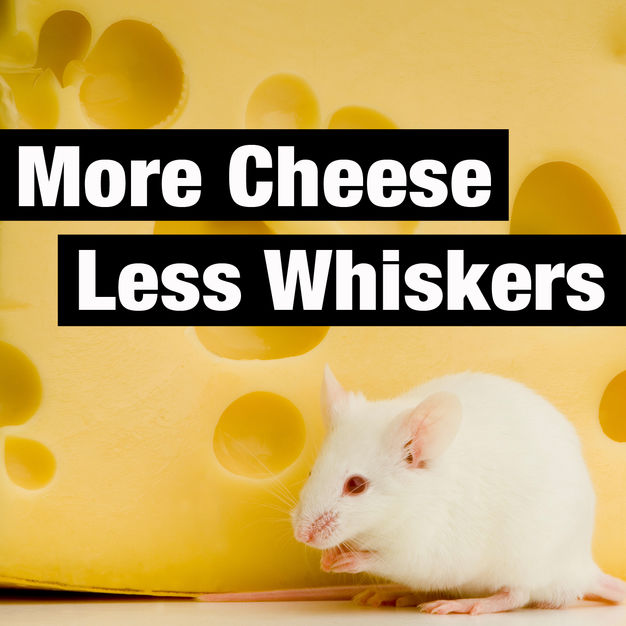 More Cheese Less Whiskers
More Cheese Less Whiskers
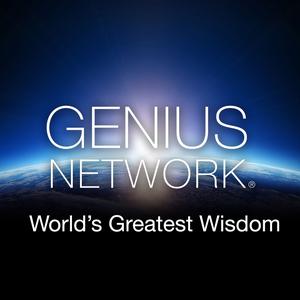 Genius Network
Genius Network
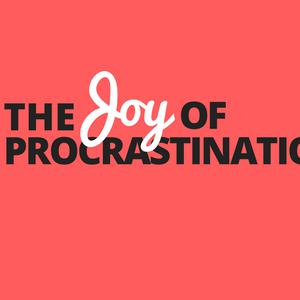 The Joy of Procrastination
The Joy of Procrastination
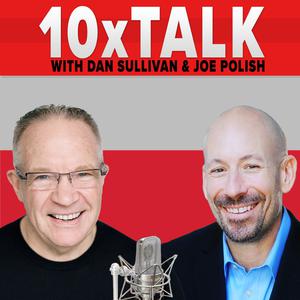 10x Talk
10x Talk
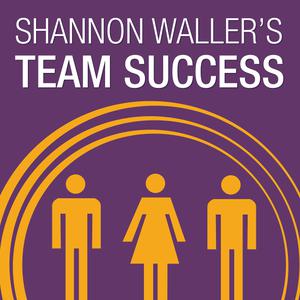 Shannon Waller's Team Success
Shannon Waller's Team Success
 Multiplier Mindset® with Dan Sullivan
Multiplier Mindset® with Dan Sullivan